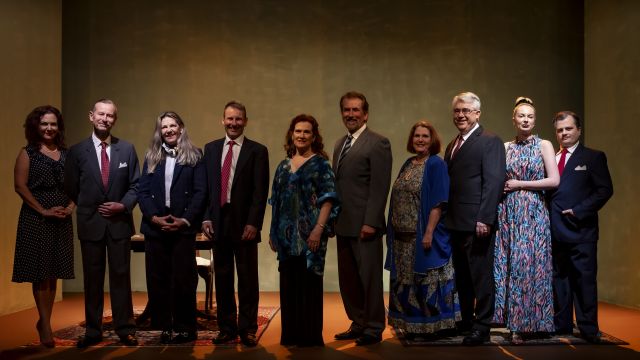Love Letters
Two characters, Melissa Gardner and Andrew Makepeace Ladd III, share a stage, reading their correspondence spanning the ups and downs of the mostly remote relationship they’ve shared over nearly half a century. A. R. Gurney’s play, a Pulitzer Prize finalist, doesn’t necessarily require the actors to learn their lines, so nightly or weekly cast turnarounds, mix’n’match seasons and limited engagement celebrity pairings have been common. At Rockdale’s Guild Theatre, four married community theatre couples perform with their spouses, along with one non-connubial pair of relative strangers, over a five-week season.
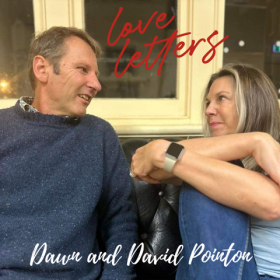
Having caught Love Letters on the opening weekend, I’m hoping to see other cast combinations over the next month, and the differences several performers I have been lucky enough to work with over the years in community theatre bring to the piece.
On the attractive, neutral set for this Guild production, Melissa and Andrew sit side by side at two desks reading letters, spanning their complex relationship, directly to the audience, never so much as glancing at each other. Lighting is simple too – lights up at the start of each act then down at the end.
The premise may not sound all that exciting but the performance I saw, featuring Dawn and David Pointon, was dynamic and riveting.
Married for 31 years, Dawn and David’s personal romance began on intersecting European trips, then actually grew through, you guessed it, a series of love letters.
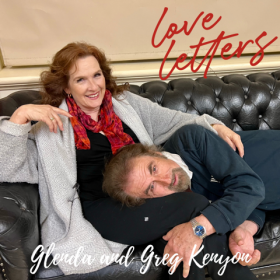
Dawn’s Melissa is vivacious, energetic, demonstrative, erratic and heart-on-sleeve, while her vivid physical and emotional reactions to Andrew’s longer missives are classic. By contrast, David’s Andrew is often reserved, and generally stolid, serious-minded, controlled and quite physically rigid. Highlights of their interplay include the power they find in the silences which mark the low points in the correspondence, and the delightful ways in which they capture rhythm – the shifts between longer and shorter messages, or the flow of streams of shorter messages. I loved this compelling performance.
David and Dawn have travelled widely and lived overseas, youthful experiences which I can well believe inform their characters and portrayals.
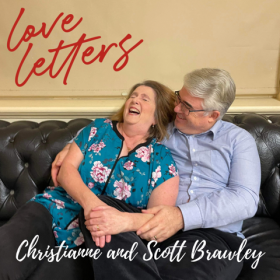
In coming weeks, four more pairings promise interpretations coloured by differences in age, life lived, family experiences and personal preferences, responding to the same set of questions posed by director Lyn Lee.
I asked Lyn for a little preview of the variations which future audiences can expect.
Many fans of Sydney community theatre over the last several decades will know Glenda and Greg Kenyon, and their family members, as performers. I’ve been lucky enough to work with them in several productions.
Greg and Glenda have “played many roles opposite each other and are so familiar with the way the other works that their responses to each other seems effortless,” says Lyn.
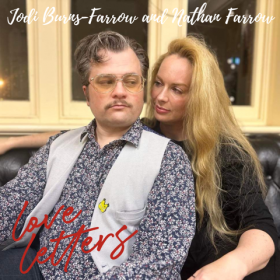
Christiane and Scott Brawley “have written, directed and performed in community theatre since their first meeting,” Lyn says. “Because of their experience as directors and writers they interrogated the script with vigour and great interest. Their choices for their characters come from a combination of life experience and exploration of the written word.”
Jodi Burns–Farrow and Nathan Farrow, the youngest couple performing the play, met through community theatre, and it's the first time they've appeared opposite each other. Nathan was brought to theatres since he was a baby, as his parents have been involved in theatre for his entire life. I’ve been lucky enough to work with Nathan and his dad Jim.
“Jodi and Nathan bring the vigour of youth, enthusiasm for each other and enjoyment of being together on stage to their performances,” says Lyn.
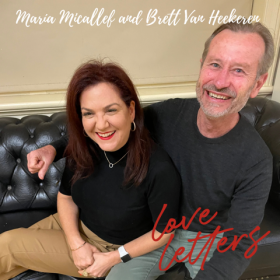
Unlike the other pairings, Maria Micallef and Bret Van Heekeren didn’t know each other, or even meet, until the first rehearsal. Again, I look forward to seeing this version, as I’ve worked on shows with Maria several times.
“They have used their differences to advantage to underpin the differences between Andy and Melissa and to bring an additional layer to the events related in the letters,” says Lyn.
It was a joy to experience Dawn and David’s performance, driven by acting, text and truth in relationships.
Neil Litchfield
Whole group photo at the top of this story is by Grant Leslie
Subscribe to our E-Newsletter, buy our latest print edition or find a Performing Arts book at Book Nook.

